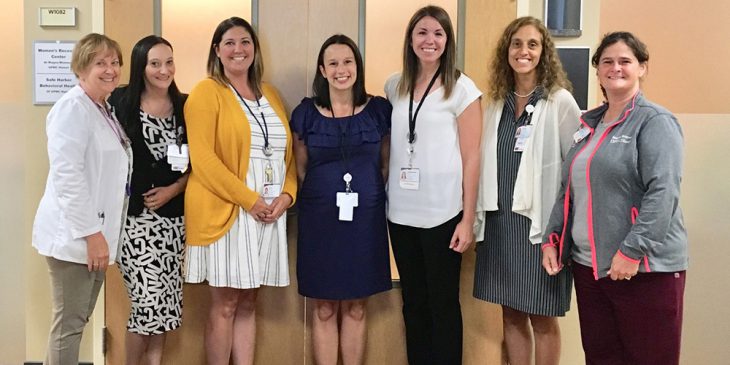In every 25 maternity hospital stays in Pennsylvania, one individual is managing a substance use disorder. Dr. Mandy Fauble, executive director of Safe Harbor Behavioral Health at the Women’s Recovery Center at Magee-Womens, UPMC Hamot, shares how UPMC is addressing this crisis in Erie.
What is the Women’s Recovery Center at Magee-Womens, UPMC Hamot, and how is it connected to the UPMC Magee-Womens Hospital Pregnancy Recovery Center?
A. The Women’s Recovery Center is a collaboration of services. The key players would be Magee-Womens, UPMC Hamot, the OB-GYN specialty group, and Safe Harbor. We all provide our own unique skill sets to the mix.
When we first got our program up and running, we had a tremendous amount of support and mentorship from the Magee Pregnancy Recovery Center. Additionally, UPMC has a telephone line called Perinatal Addiction Consultation Education Service (PACES) that is a way that we can contact Oakland to have a consult if we need it.
How many patients has the center helped since opening in January 2018?
- A. We have had 10 babies born to moms in our medication-assisted treatment program, and only one had a Neonatal Intensive Care Unit (NICU) stay. We have had eight babies born to moms in our case management program, none of which had to stay in the NICU! Overall, we have served about 140 women with over 100 children in their care.
What kind of services does the program provide?
A. We provide services for women who are pregnant and have a substance use concern, including:
The OB-GYN specialty group covers the medication-assisted treatment for women who have an opioid use disorder. Because they have that focus on women’s health, they can deliver care in a much more holistic way versus only thinking about the substance use disorder treatment.
Our team at Safe Harbor provides a couple of different services: outpatient and intensive outpatient counseling, mobile case management, and a certified recovery specialist.
Our mobile case managers are the gems of our program. Substance use disorder tends to be a result of a lot of traumatic incidents in a person’s life. A lot of the women, and their kids, that we work with have many needs. On clinic days, the case managers make sure everyone is on the same page with what’s most important to the patient, and how we can all play our part to support recovery.
We also have a certified recovery specialist. Our recovery specialist is a mom that has experienced a substance use disorder while trying to parent. She has been in recovery for a significant amount of time and really acts as a mentor to the women we serve.
Why is the Women’s Recovery Center an important service in the Erie community?
A. Reducing that stigma and being a friendly, welcoming place for women to get the treatment they need can help preserve families. We know that if we engage women in treatment early in their pregnancies, we can substantially reduce the risks to their babies and the likelihood of a NICU stay.
Substance use disorder impacts people of all walks of life, all ages, and all demographics. And, that means that pregnant women and women with children are part of that story.
What are the future goals for the program?
A. One goal is continued expansion of our case management and peer support program elements of our program, the medication-assisted treatment program, and continuing to build relationships with organizations that serve women who are in vulnerable situations.
Additionally, we’re working on how to expand the program into rural communities and harder-to-reach areas. The Hamot Health Foundation just received a Health Resources and Services Administration planning grant. It will be used to address the opioid epidemic in rural areas, focusing explicitly on women and children.








